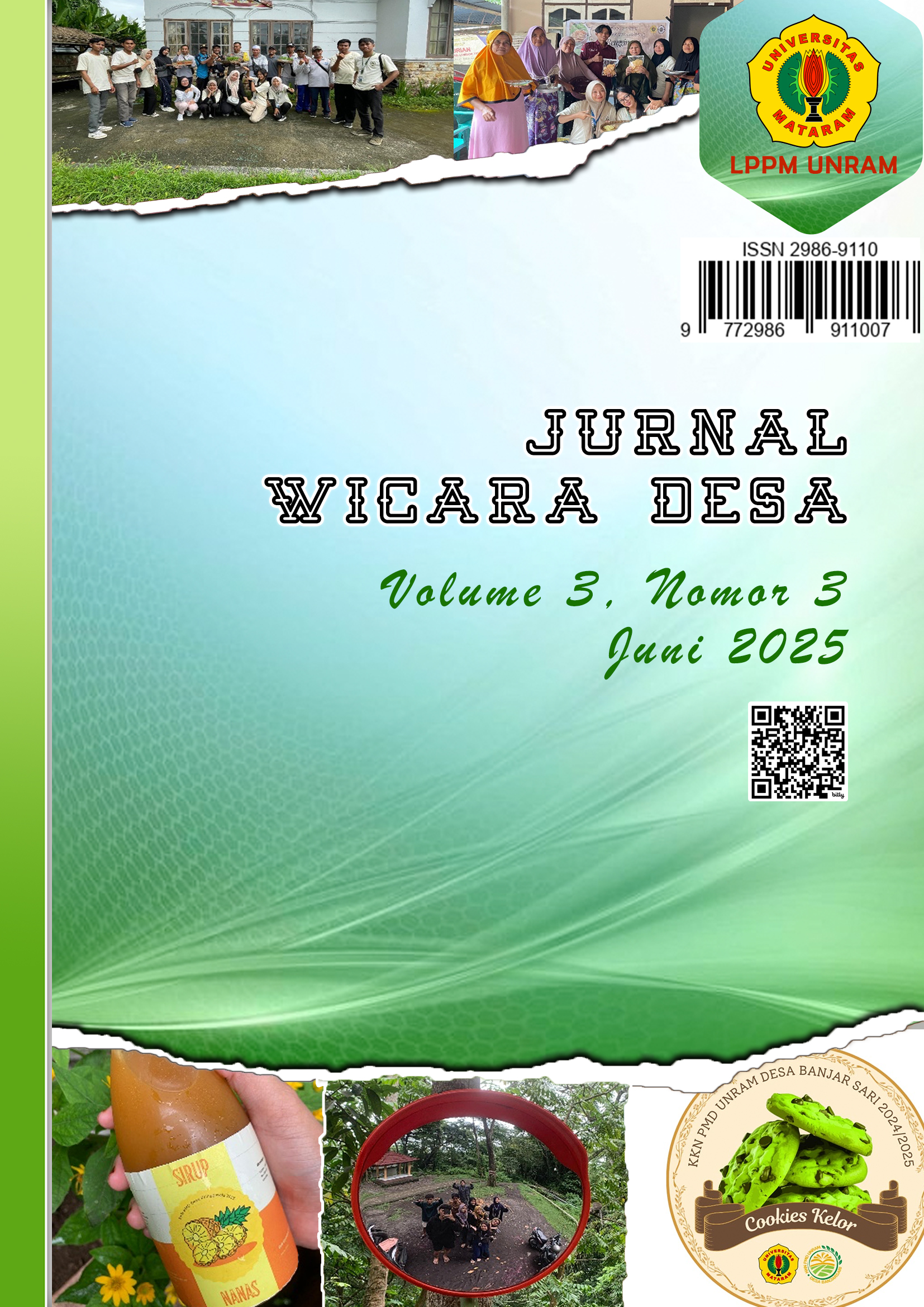Socialization of Plant Pest and Disease Control (HPT) Based on Organic Farming in Supporting Green Economy in Tumbuh Mulia Village
DOI:
https://doi.org/10.29303/wicara.v3i3.6729Keywords:
Organic Farming, Plant Pest and Disease, Counseling, Organic PesticidesAbstract
Organic farming in Indonesia is gaining more attention as a sustainable alternative to
addressing environmental and health challenges. The decline in agricultural land
productivity and environmental degradation have driven the developments of organic
farming systems. Organic farming can serve as a safer alternative system as it
produces products free from synthetic chemical contaminants while also preserving
environmental sustainability. The outreach activities on organic plant pest and
diseases (PPD) control in Tumbuh Mulia Village aim to support the development of
green economy. PPD control prioritizes an approach that integrates various methods
that manage pest populations while considering economic efficiency and
environmental impact. These activities include counseling and training for farmers on
the use environmentally friendly botanical pesticides. The discussions with farmers
group revealed that pest infestations as brown planthoppers, whiteflies, and
mealybugs, as well as diseases like stem rot and root rot, which contribute to
decreased crop yields. The outreach program, involving 38 participants, successfully
improved farmers' knowledge of pest and disease identification and control.
Participants’ enthusiasm during discussion and demonstration sessions indicated their
readiness to adopt new techniques in agricultural practices. Thus, this outreach
initiative is expected to have a positive impact on improving agricultural yields and
the well-being of the community in Tumbuh Mulia Village.
References
Afrianto, D. 2014. Pengaruh Penyuluhan Terhadap Pengetahuan, Sikap dan Tindakan Petani
Paprika di Desa Kumbo – Pasuruan Terkait Penggunaan Alat Pelindung Diri (APD)
dari Bahaya Pestisida. Skripsi. Program Studi Kesehatan Masyarakat Fakultas
Kedokteran dan Ilmu Kesehatan Universitas Islam Negeri (UIN) Syarif Hidayatullah.
Jakarta.
Asril, M., Lismaini., Ginting, M. S., Suryani, E., Wati, C., Ahsan, M., dan Joeniarti. E.
(2022). Pengelolaan Hama Terpadu. Penerbit Yayasan Kita Menulis; Medan.
Ayusma, A.N. (2021). Pestisida Nabati Salah Satu Solusi Untuk Petani. Fakultas Pertanian,
Universitas Gadjah Mada.
Indriyati, L.T., Sugeng, S., dan Enjeline, I. 2024. Dampak Pertanian Organik dan
Konvenional pada Biodiversitas dan Sifat Kimia Tanah pada Budidaya Tanaman Padi
Sawah. Jurnal Ilmu Pertanian Indonesia. 29 (3), 331-340
Kusumawati, D. E., & Istiqomah, I. (2022). Pestisida Nabati sebagai Pengendali OPT.
Laksminiwati., Prabani, G., Tonny, K., Moekasan., Witono, A., dan Nikardi, G. (2015).
Empat Prinsip Dasar Dalam Penerapan Pengendalian Hama Terpadu (PHT). Balai
Penelitian Tanaman Sayur: Jawa Barat.
Nurkholis, N., Saechon, S., dan Susanti, I. (2023). Penerapan Teknologi Pengendalian Hama
Terpadu (PHT) dalam Pengembangan Tanaman Kubis. Jurnal Ilmiah Hijau
Cendekia, 8(1), 31-37.
Singkoh, M., dan Katili, D. Y. (2019). Bahaya Pestisida Sintetik (Sosialisasi dan Pelatihan agi
Wanita Kaum Ibu Desa Koka Kecamatan Tombulu Kabupaten Minahasa). JPAI:
Jurnal Perempuan Dan Anak Indonesia, 1(1), 5-12.
Siregar, F. A. (2023). Pengaruh Penggunaan Pestisida Nabati Dalam Pengendalian Hama Dan
Penyakit Tanaman.
Sutriadi, M. T., Harsanti, E. S., Wahyuni, S., & Wihardjaka, A. (2019). Pestisida nabati:
prospek pengendali hama ramah lingkungan. Jurnal Sumberdaya Lahan, 13(2), 89-
101.






